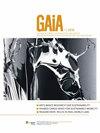参与式情景规划:可持续发展的参与式研究方法—工具包#3
IF 1.9
4区 社会学
Q4 ENVIRONMENTAL SCIENCES
引用次数: 3
摘要
实现可持续和公平的未来需要对这些未来可能是什么样子以及如何实现这些未来有一种认识。参与式情景规划(PSP)在利益相关者参与的知识共同生产过程中探索不同的未来情景。PSP使用不同的方法来识别相关的利益相关者,创建一组场景,并探索将这些未来愿景与现在联系起来的方法。本文章由计算机程序翻译,如有差异,请以英文原文为准。
Participatory scenario planning: Participatory research methods for sustainability ‐ toolkit #3
Achieving sustainable and equitable futures requires a sense of what those futures might look like, and how to get there. Participatory scenario planning (PSP) explores diverse future scenarios in a stakeholder-engaged process of knowledge co-production. PSP makes use of different methods
to identify relevant stakeholders, create a set of scenarios, and explore ways to connect those future visions to the present.
求助全文
通过发布文献求助,成功后即可免费获取论文全文。
去求助
来源期刊

Gaia-Ecological Perspectives for Science and Society
ENVIRONMENTAL SCIENCES-
CiteScore
2.30
自引率
18.80%
发文量
43
审稿时长
>12 weeks
期刊介绍:
GAIA is a peer-reviewed inter- and transdisciplinary journal for scientists and other interested parties concerned with the causes and analyses of environmental and sustainability problems and their solutions.
Environmental problems cannot be solved by one academic discipline. The complex natures of these problems require cooperation across disciplinary boundaries. Since 1991, GAIA has offered a well-balanced and practice-oriented forum for transdisciplinary research. GAIA offers first-hand information on state of the art environmental research and on current solutions to environmental problems. Well-known editors, advisors, and authors work to ensure the high quality of the contributions found in GAIA and a unique transdisciplinary dialogue – in a comprehensible style.
 求助内容:
求助内容: 应助结果提醒方式:
应助结果提醒方式:


